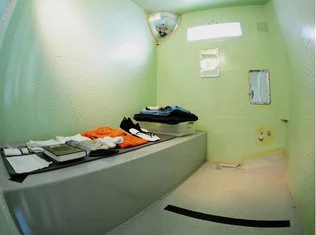What is solitary confinement?
Using many different euphemisms across the United States, such as restricted housing units, special housing units, or isolation, local, state, and federal governments place imprisoned individuals in a cell that cuts off their access to and interaction with others, often for 23 hours per day. The justifications often provided for solitary confinement are punishment and safety for self and others. Placing an individual in solitary is not a decision subject to due process through judges or juries in a court of law, rather it is decided by prison officials after an individual has been sentenced.
How does it affect individuals with whom iustitia works?
Individuals with mental illness, autism, bipolar disorder, and intellectual disabilities are disproportionately affected by solitary confinement, particularly people of color. When jailers do not understand the behaviors of individuals with autism or mental illnesses, such as discomfort with being touched, they punish incarcerated persons for their behavior, instead of providing assistance. At other times, incarcerated vulnerable individuals are placed in solitary confinement as a means of their own protection from other prisoners, even though other means of protection may be available.
No matter the use, solitary confinement is dangerous for healthy people. For those with mental illnesses or intellectual disabilities, solitary confinement is destructive. It can dramatically exacerbate symptoms of mental illness and cause lasting negative effects on mental well-being. United Nations (UN) Special Rapporteur on Torture and Other Cruel, Inhuman and Degrading Treatment or Punishment, Juan Méndez, has condemned the practice of solitary confinement except in very exceptional circumstances and for as short a time as possible. Furthermore, the Special Rapporteur points out that in many cases, solitary confinement can amount to torture or cruel, inhuman or degrading treatment or punishment. The UN Committee Against Torture has also recommended drastic reform of the excessive practice of solitary confinement in the United States, finding several violations of the UN Convention Against Torture and Other Cruel, Inhuman or Degrading Treatment or Punishment (CAT).
How does iustitia advocate and educate on this issue?
iustitia works with individuals who are placed into solitary because of their mental illness, intellectual disability, autism, or bipolar disorder. By connecting directly with these individuals or their families, iustitia fights against their solitary confinement without proper review and for more humane methods of imprisonment and appropriate treatment to prevent the recurrence of the events that led to placing them in solitary confinement in the first place.
Recent Developments:
- The international community, as well as individual states are increasingly moving away from the use of solitary confinement, particularly as we learn more about the mental health and developmental effects of this cruel practice.
- December 2015: After a lawsuit by the NY Civil Liberties Union, New York State agreed to dramatically reduce the number of individuals in solitary confinement in its prison system.
- September 2015: The state of California agreed in a settlement to reduce the numbers of individuals in solitary confinement, or what one expert called “social death.”
Read more about related issues on our blog.
- Evolving Standards of Decency Don’t Include Solitary Confinement for Autistic Prisoners
Will the Bipartisan Consensus on Criminal Justice Reform Survive?
